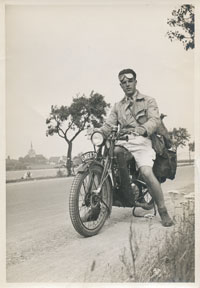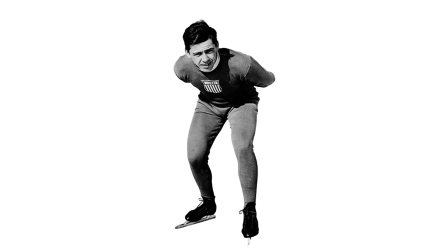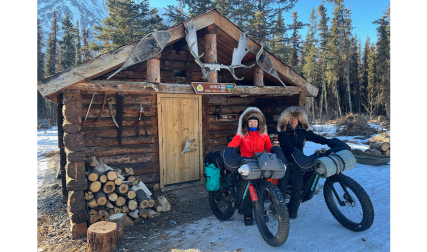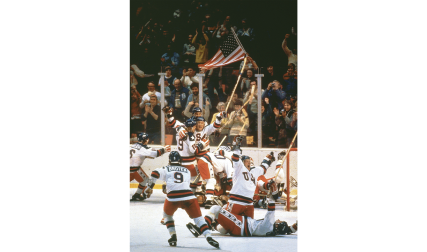Objets D’Artmouth
Thank you for your “History of the College in 50 Objects” [Mar/Apr]. My dad, Nels Abrahamsen ’49, and I really connected over it. He suffers from dementia and is losing his ability to read, but not to comprehend, complex ideas. We read it together, enjoying the pictures and sharing memories. Dartmouth and its place in his life run so deep that those memories are still pretty fresh. We both got a kick out of learning that a monteith is a punch bowl with a pierced rim for holding cups. Dartmouth is still educating us both.
Laura Abrahamsen ’85
Lakewood, Ohio
Regarding your recent fine article it seems to me you should have started with 500 gallons of New England rum!
Herb Knight ’51, Tu’52
St. Charles, Illinois
Thank you for providing an unvarnished view of the history of the College. I couldn’t help but notice that most of the objects relating to people of color or women involved their struggle to become unqualified members of the Dartmouth community—and that these attempts were precipitated by the students and not necessarily by the administration. (One example: “Plea to Admit Edward Mitchell, Class of 1828.”) Maybe, in the end, that is the ultimate lesson.
William F. Young ’78
Fort Wayne, Indiana
Your cover story couldn’t help but intrigue almost everyone connected to Dartmouth. Surprisingly (or not), the introduction of skiing (“vintage wooden skis”) and the gift of Mount Moosilauke (“Moosilauke Summit Camp”) are linked.
In 1947 DAM published a photo of the “10 earliest skiers” from the class of 1897 with their detailed recollections of how they acquired their skis during the winter of 1895-96. The men described include my great uncle Herman Holt Jr., class of 1897, and my grandfather, Edward K. Woodworth, class of 1897, who was one of two donors of Moosilauke’s summit and hotel. The other was his brother, Charles Parker Woodworth, class of 1907. Both brothers, as officials of the Parker Young Co., later helped Dartmouth secure the remainder of the mountain not already part of the White Mountain National Forest. Ned and Charles Woodworth specified that the mountaintop be “open to all.” It’s heartening that freshmen to this day enjoy the mountain as part of their Dartmouth experience.
Lane Woodworth Goss ’55
North Andover, Massachusetts
I got a huge kick out of perusing the collection of artifacts from Dartmouth’s early years, but one item presented as an “unclear” mystery should be readily understandable: The medal presented to John Wheelock in 1785 by London pawnbroker John Flude was surely meant as an homage to the newly independent United States.
Engraved on the medal’s reverse is a shield decorated with an early representation of stars and stripes. The motto “Unanimity is the strength of society” was probably a not-so-subtle encouragement to the nation that had thrown off its British masters less than a decade earlier.
It’s worth remembering that John Adams had a celebrated audience with King George III in 1785, as the defeated monarch greeted his former bitter enemy for the first time as a fully fledged ambassador. George’s loyal subjects—including pawnbrokers—took notice when he told Adams that he was finally ready “to meet the friendship of the United States as an independent power.”
The Aesop fable illustrated on the medal highlights the strength of cooperating brothers and their weakness when they stand alone. Benjamin Franklin set the tone for this at the signing of the Declaration of Independence when he told his fellow risk-takers, “We must, indeed, all hang together or, most assuredly, we shall all hang separately.”
David Martosko ’91
Burke, Virginia
More so than “descendants of John Dickey ’29,” his wife, Christina Dickey (also my mother), was responsible for most of the work that went into the needlepoint seat cushions honoring Dartmouth’s presidents. She worked the first 12 between 1958 and 1970.
Christina (Dickey) Stearns
Shelburne, Vermont
Great idea! Great article! Thank you!
E. Clothier Tepper ’83
Boston
Your item displaying “time sharing punch cards” says, “DTSS [the Dartmouth Time Sharing System] depended on punch cards such as these to host 300 simultaneous users.”
Punch cards like those shown in the article were used to boot the computer during the first several months of the project. They were gone entirely within a year or two.
What John Kemeny and I and our undergraduate students did with time sharing and BASIC was to eliminate the need and use of punch cards for our students and faculty and, eventually, millions of folks around the world.
Thomas Kurtz
Hanover
Editor’s Note: Dartmouth professor emeritus of mathematics and computer science Thomas Kurtz co-developed BASIC with John Kemeny.
In 1968 I arrived in Hanover as a typical wide-eyed, intimidated freshman. In a winter term science elective I was allowed, nay, even invited, to enter the brave new computing world of the Kiewit Center, and iterate simple Newtonian physics computations designed to plan destruction of the earth using an artificial moon of great mass.
Later in my career we happy few, we band of brothers, gained keys to the underground mini-computer where we could play herbally enhanced “space wars,” giggling uncontrollably. Upstairs hosts of other more serious time-sharing users flogged the ranks of paper-roll TTY machines in search of computer-generated wisdom.
I never even saw a punch card until after I graduated.
Bruce Westcott ’72
Cabot, Vermont
I have a suggestion for future coverage of that which we alumni value highly. How about a fair and balanced caption for The Dartmouth Review rather than what you wrote about the shanty shard, not to mention your open praise for the Marxist Orozco murals and disdain for their contemporary Hovey paintings?
Try this: The often controversial Dartmouth Review, published independently by Dartmouth students (and funded by sympathetic alumni) is about to celebrate 35 years of continual publication. It remains the College’s preeminent voice for conservative opinion as it provides spirited contrast to the liberal bias that permeates almost every American university and most notably those of the Ivy League.
Michael G. Wygant ’58
Scarborough, Maine
The beer pong item confirmed for me yet again why I have often felt alienated from the College: “Just about every student in recent memory has played the drinking game.” I didn’t during my five years on campus nor have I at any time since then. As long as consumption of alcohol is lauded and not played down, it will continue to be a serious problem at Dartmouth and, for some, long after leaving the Hanover Plain.
Ted Tapper ’61, DMS’62
Merion Station, Pennsylvania
The circular slide rule on page 31 of the Mar/Apr issue is for calculation, not measurement.
Michael Butterworth ’63
Tolland, Connecticut
Calling a slide rule a measuring device is like calling an abacus a yardstick.
Dave Reingold ’71
Portland, Oregon
Stars War
One of my favorite parts of DAM is the “Continuing Education” interview on the last page, but I was very disappointed with the Mar/April subject, Wayne Moody ’73. Astrology? Really? I thought we expected our students to leave Dartmouth with critical thinking skills. What’s next? Climate change denial? Alchemy? A flat-earth believer?
Couldn’t you have found someone who functions in the real world and who has put his or her valuable Dartmouth education to better use?
As for Moody’s prediction of trouble in places such as Afghanistan, Syria and the broader Middle East, I will be sure to pay close attention to the news come February 2022. I have it marked on my calendar, should we survive that long.
Erik Roskes ’86
Baltimore
Bravo, Wayne Moody! Your journey and transformation is remarkable and noteworthy. Anyone who knew Moody as a stand-out incredible Dartmouth College football titan of the 1970s would find this wonderful insightful article inspirational.
What’s next? More real-life stories, discoveries and the acceptance of what we don’t understand? What you can’t see may be your reality.
Sedrick Tydus ’74
Oakland, California
Science defines its uncertainty. Does astrology? I am not last-page alumni magazine material, just a guy who has shared his love of the sky with many, continuing a chain that connects us with our ancestors, each generation asking, “What’s out there?” “Who are we?” and “Why are we here?” I believe the answers lie in science, not astrology.
Michael S. Smith ’70
Eugene, Oregon
I took the liberty of looking at the interviewee’s website and was confounded by the language. With some paraphrasing his posts include the following: “With our emotional and intuitive tools, we can discover a stone’s aliveness.”…“Madame Curie discovered aliveness in stone, which came to be known as radiation.”…We need to “identify zones where a particular planet might have experienced as angular had the United States been established in South Dakota or Sweden rather than Philadelphia.”
Does this make sense?
Bob Sanner ’67
Palo Alto, California
 Easy Rider
Easy Rider
Harry Espenscheid ’34 must have inspired my father, Bill Fitzhugh ’35 (left), after they met in Cambridge at the start of Espy’s round-the-world trip [“The Rambler,” Jan/Feb]. When he finished at Trinity College in 1937, Dad jumped on an Excelsior motorcycle and headed east, along Espy’s same route, I believe. Unfortunately his circumnavigation ended in India. When he learned his mother was sick, he took a boat home to Brooklyn.
He talked of the trip for the rest of his life.
Josh Fitzhugh ’70
West Berlin, Vermont
Airing Laundry
Since the publication of the Rolling Stone piece about fraternity hazing, most of the Dartmouth community has been in conversation about unacceptable behavior and its sources. It seems to me that the conversation, which is furthered by “Outside Looking In” [Jan/Feb], has the power of a disinfectant. It needs continuation. The end is preexistent in the means; the conversation is a means to a Dartmouth made whole.
Joe Herring ’55
Alpharetta, Georgia
What’s up with Mar/Apr letter writers? The first letter to the editor has a long bitter diatribe about Dartmouth’s “unchecked loutishness, sexual violence, mindless pervasive drunkenness,” etc. The second letter complains about the intensity of Dartmouth’s “party culture” and “attendant exclusivity and sexual assault issues.” The third letter complains that we are all “white, thin, male, heterosexual, Christian and financially secure.” The fourth letter complains that Dartmouth is “elitist,” a word, by the way, that lately seems to offend liberal sensibilities about equality.
Good Lord! If we readers—nearly all alumni—want to get that big a dose of left-wing caterwauling we can watch MSNBC or read The New York Times.
Tom Holzel ’63
Litchfield, Connecticut
Country Strong
As a freshman I interviewed for an announcer position with WDCR in 1949 but was told that my Oklahoma accent disqualified me [“Making Waves,” Jan/Feb]. So, I started a country-music program called “Western Styles in Music,” which ran until 1953.
Along with my co-broadcasters, Sylvester “Buzz” Johnson ’53, Kermit Ingam ’52 and others, we were country before country was popular, playing lots of Merle Travis, Woody Guthrie and Pete Seeger. Our listener base consisted of the few Dartmouth students from the West and Southwest, who thrilled to the sound of our theme song, “Steel Guitar Rag,” and requested such country classics as “My Son Calls Another Man Daddy” and “Oklahoma Hills Where I was Born.”
Dave Godschalk ’53
Chapel Hill, North Carolina
In Praise of Bernanke
What gives with your “Ask The Expert” column [“Campus,” Jan/Feb] titled “How to Fix the Fed?” Yikes! Fix what/whom?
Were it not for Chairman Ben Bernanke and his Fed, all of us might likely be out of business, by my lights. I say this as a long-time Fed watcher and former Wall Street broker/banker.
Simply stated, Bernanke aggressively and appropriately pulled our fat out of the fire when fiscal policy became restrictive as the party out of power in Congress fabricated a “debt issue” in order to counter their otherwise helplessness.
Of course debt will be “high” when it comes time to “prime the pump,” as even Econ 101 teaches. And no, no, no: Do not do away with the little “blips” that show where policymakers (at the Fed) stand as to Fed policy. This is transparency, gals and guys. Remember: We are for that.
Maybe it would be better to ask an expert to write “How to Fix the Congress?”
John F. Patterson ’60
Norwalk, Connecticut




